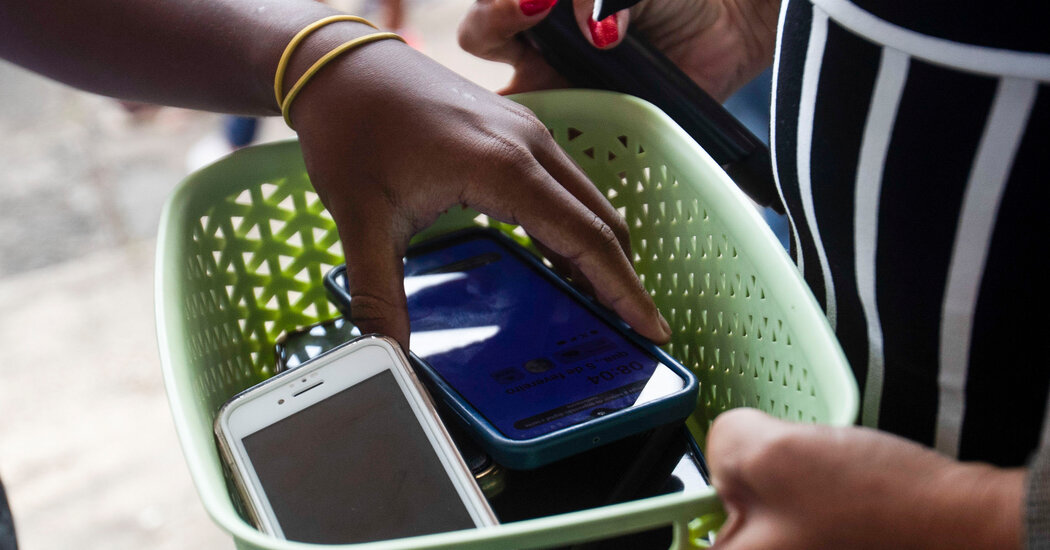Does your school ban cellphones? If so, do you think the policy is working to keep students off screens and focused in class? If your school doesn’t have a ban, do you wish it did?
Imagine such a ban went even further. A new law in Australia, which goes into effect next month, will restrict anyone under 16 from having a social media account. Would you like to see your government outright prohibit children and teens from using social media, or do you think that goes too far?
In “Banning Social Media,” the Nov. 9 edition of The Morning newsletter, Natasha Singer writes about how more schools and governments are turning to tech bans to try to keep kids off screens:
Bullying. Sextortion. Body-shaming. Self-harm. Viral student-fight videos. Never-ending newsfeeds. Unhealthy relationships with A.I. chatbots. Teenagers who can’t seem to put down their phones.
Parents and teachers are understandably concerned about social media. For all of the community, creativity and just plain fun kids enjoy online, hazards remain all too frequent, some children’s advocates say.
Over the past few years, as public concern over youth mental health has mounted, government and education leaders have been searching for ways to reduce online risks.
The article continues:
Some lawmakers and schools are resorting to tech bans.
One of the most sweeping is in Australia, where the government is trying to keep most kids off social media. Starting in December, the country will require platforms like Instagram, TikTok and YouTube to take “reasonable steps” to prevent Australians under the age of 16 from having accounts. As my colleague Victoria Kim in Sydney has reported, the country also wants social apps to deactivate existing accounts belonging to more than one million young Australians.
The Australian ban could address a vexing problem. Regulators complain that social networks have enabled millions of young children under the age of 13 to sign up for accounts, without sufficiently enforcing the companies’ own age restrictions. But the ban could affect social media benefits like friendships, UNICEF Australia has said, without fixing the problems young people face online. “Social media has a lot of good things, like education and staying in touch with friends,” the organization said in a statement on its website.
Britain has taken a different approach — by promoting increased privacy and time management controls, rather than banishing young people from apps. In 2020, Britain began prohibiting services like social networks and video game apps from using “nudging techniques” to steer young people to give up more data. Online services must also turn on the highest privacy settings by default for kids under 18. In 2022, California enacted a similar law. But a lawsuit by NetChoice, an industry trade group, has halted it, at least for now.
Schools are also trying to curb tech distractions. Today, 40 percent of countries bar or restrict student cellphone use, as do more than 30 U.S. states and the District of Columbia.
We have limited research on whether the bans work. After surveying more than 1,200 students in 30 schools across England, researchers at the University of Birmingham recently reported that cellphone bans did not improve students’ mental well-being.
Students, read the entire article and then tell us:
- Do you think blanket technology bans — such as barring children under 16 from social media or banning cellphone use in classrooms — work for teenagers? Why or why not?
- What are some of the benefits you’ve experienced from social media and cellphones, if any? What are some of the problems that have come with this technology? Do you think the joys outweigh the harms?
- How concerned do you think parents, teachers and lawmakers should be about teenagers’ online activity? Do you believe the issue is big and urgent enough that the government should intervene?
- The article notes that countries are taking different approaches to managing online risks for young people. Australia has introduced an outright social media ban for children under 16, while Britain has promoted privacy and time management controls in apps. Which strategy do you think will be more effective, and why?
- What ideas do you have for helping teenagers reduce their screen time? Who should be responsible for doing so — parents, schools, social media companies, governments, teens themselves or some combination of these groups?
Students 13 and older in the United States and Britain, and 16 and older elsewhere, are invited to comment. All comments are moderated by the Learning Network staff, but please keep in mind that once your comment is accepted, it will be made public and may appear in print.
Find more Student Opinion questions here. Teachers, check out this guide to learn how you can incorporate these prompts into your classroom.
Natalie Proulx is an editor at The Learning Network, a Times free teaching resource.
The post Do Technology Bans Work for Teenagers? appeared first on New York Times.




